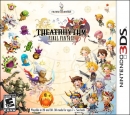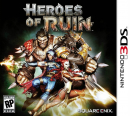RolStoppable said:
Soundwave said:
Switch launch is mainly predicated on the ashes of the Wii U, remove BOTW, Splatoon 2 (quickly retooled Wii U sequel), and Mario Kart 8 and the launch year window for the Switch is fairly poor.
It's easy to shit on the Wii U, but I'm also sure the Wii U probably would've had a much easier go of it if you gifted the system Zelda: Skyward Sword as a launch game, a Mario Kart game in its 2nd month on market, and moved the hit game Splatoon from its 3rd year into its first 6 month window that it would've developed significantly more momentum.
The last launch that Nintendo did that was legit all around good was probably the Super Nintendo, but even there that was in the days when North American/European launches traditionally happened 9-16 months after the Japanese launch. So they were able to have Super Mario World, F-Zero, Pilotwings, Super Ghouls N' Ghosts, Final Fight, and other games ready and just as important "2nd wave titles" like Zelda III and Street Fighter 2 arrived the following spring and summer.
And people complained that wasn't good enough back then, lol.
The fact is despite people saying it over and over again, late gen support for a system really does not do anything for a game company in the long term. No one complains or bitches today that the GBA, GameCube, and Wii U were cut short ... why? Because they liked the successors so they have convenient amnesia about those cases.
It's basically: "Fuck you Nintendo, you fucked me on Wii U, where are all the damn games? I'll never buy another sys ... is that Breath of the Wild? On a 6 inch screen? But now on the bus? You had me at Zelda, you brilliant bastards take my $400 because I need neon Joycons to complete my life".
Always err on the side of the new console's launch being the priority. No one cares about your late gen support for your previous system the second they get a gaming-boner from your new system reveal. But if your new system reveal isn't great or you need a little patience from the consumer .... good fucking luck selling that. All of the sudden you're as popular the guy coughing loudly in a grocery store.
|
You act as if the Wii U didn't absorb Wii games, but it actually got blessed with a sequel to New Super Mario Bros. Wii as a launch title which sold much more than Skyward Sword would have. Pikmin 3 was moved to the Wii U. Quite a few of the earlier Wii U games might as well have been released on the Wii.
Nobody complains about the GBA because, as already pointed out by Jumpin earlier in this thread, the GBA continued to see a robust lineup of games even after the DS had launched, so ultimately the GBA got good games for five years and wasn't left to die. On the flipside, people don't mind the GC and Wii U getting cut short because people wanted them to be over, so prolonging the misery wasn't something that anyone wanted.
Late gen support does matter for successful consoles because there's still a big active userbase buying games. You get disgruntled customers if you cut short and force an upgrade by putting all your new releases on the new console too quickly. Unsuccessful consoles don't have that problem because hardly anyone still cares about buying software for them.
|
This is the list of major Nintendo published software for the Game Boy Advance completed after December 2004 (DS launch in Japan) that had worldwide release outside of the Famicom game re-releases:
Mario Party Advance, Dr. Mario & Puzzle League, Donkey Kong: King Of Swing, Mario Tennis, DKC3 port from Rare. In 2006 the GBA basically got Pokemon Mystery Dungeon and that's all she wrote unless you lived in Japan and got Mother 3.
https://en.wikipedia.org/wiki/List_of_Nintendo_products#Game_Boy_Advance
Is that supposed to be impressive? Not a single one of these games was even developed by any of the main EAD teams, they're all farmed out to studios like Tose and Chunsoft.
GameCube was much the same story, after 2004, basically all the main EAD teams stopped development for it even though it was only 3 years old. DK: Jungle Beat was completed in December 2004 and then the only GCN title that EAD directly worked on was Zelda: TP which obviously would become a launch title for the Wii.
The XBox was also cut off and that was even more surprising because 2004 was literally I believe the peak sales year for the XBox (lol). It had widened its gap over the GameCube and was even starting to outsell the PS2 in certain months. That didn't hurt the XBox 360 at all.
The real truth is Sega is really the only one that suffered from bad repercussions from poor support of systems. And really Sega went to some extreme shit if you actually look at the history there for things to get that bad.
They stopped Sega CD support largely after 1994, after just 2 years, they killed the 32X in basically six months, and the Saturn we know that story. But even on top of that they never released like a proper new Sonic game on the 32X or Saturn. At least with the Wii U or GameCube you can't complain that you didn't get a new Mario game.
All 3 of the most successful modern Nintendo systems had predecessors where Nintendo yanked support early, yet Nintendo suffered no real consequence from that. The most successful XBox system is also the same story. To me that shows a pretty definitive trend that late gen console support is vastly overrated. If consumers were so angry they should never have bought the DS after the GBA, they never should've looked twice the Wii after the GameCube, or XBox 360 after the XBox, or Switch after the Wii U.
Once I could see it being a fluke, but when 4/6 best selling modern systems have the same story, it's hard to ignore. Conversely, both successors for the best selling + best supported platforms (PS2 and DS) had harsh early life cycle struggles in 3DS and PS3. Which goes to show gamers really don't care how much entertainment you've given them in the past when it comes time to decide what they want to play now and in the future.
You can give them your all, push your dev team to exhaustion, give every possible IP you can, do everything perfect, and guess what? Within 12 months and a new system launch (which must happen eventually) alllllllll that work and goodwill you think you've banked is now worthless the second you make 1 or 2 mistakes or need a few extra months of patience.
Last edited by Soundwave - on 10 August 2020






















































